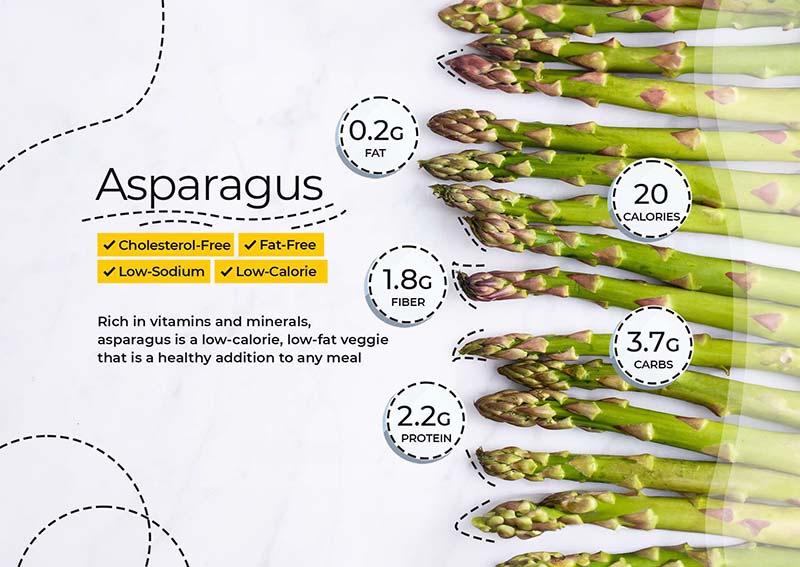When it comes to weight loss, every food choice counts, and asparagus is one such choice deserving attention.
This blog focuses on the important question: “Is asparagus good for weight loss?” and unveils how asparagus, beyond its culinary versatility, is a powerhouse of nutrients that can aid in your weight loss journey.
Read more
- Is Arugula Good for Weight Loss? Science-Backed Benefits.
- Is Edamame Good for Weight Loss? Benefits of Edamame.
- Does Kale Make You Lose Weight? Superfood Secrets.
Is Asparagus Good for Losing Weight?
Asparagus is a great food for anyone looking to keep their weight in check or even lose a few pounds. It’s low in calories but still packs in important stuff like fiber. The great thing about eating foods like asparagus, which don’t have a lot of calories, is that you can eat a good amount of it without worrying about gaining weight. Since it’s mostly water and low in calories, filling up on asparagus won’t make you put on the pounds.
Research supports the weight loss benefits of high fiber foods like asparagus. A study in the Journal of Nutrition found that increased fiber intake can aid in weight loss, particularly in calorie-restricted diets.
Asparagus: An Overview
Garden asparagus, scientifically known as Asparagus officinalis, belongs to the lily family. This plant is quite unique – the part we eat is actually the young shoot, appearing as slender spears with scaled, pointed tips. If not harvested, these shoots transform into a large, feathery fern-like plant that withers away come autumn.
Asparagus is cultivated globally, with major producers including China, Peru, Germany, and the U.S. It prefers climates where the ground experiences freezing temperatures, as the spring thaw and warmer weather stimulate the spears to sprout from the soil. The ideal time to harvest asparagus is when the spears are about 6 to 8 inches tall and half an inch thick. The spears initially are slender, then become thicker as the season advances, and finally start to thin out again. Harvesting ceases when the spears are only as thick as a pencil.
Cultivating asparagus requires both patience and space. You’ll need several square feet for each plant, and from planting the seeds, it can take 3 to 4 years before the spears are ready to eat. This long growth period and the brief harvesting season contribute to asparagus’s reputation as a luxury vegetable, which sometimes reflects in its higher price in stores. Despite this, asparagus is among the simplest vegetables to prepare and cook.

Nutritional Composition of Asparagus
Asparagus is not only low in calories but also rich in nutrients, making it an outstanding choice for a healthy diet. Just consider this: a mere half-cup serving (90 grams) of cooked asparagus provides:
- Calories: 20
- Protein: 2.2 grams
- Fat: 0.2 grams
- Fiber: 1.8 grams
- Vitamin C: 12% of the Recommended Daily Intake (RDI)
- Vitamin A: 18% of the RDI
- Vitamin K: 57% of the RDI
- Folate: 34% of the RDI
- Potassium: 6% of the RDI
- Phosphorous: 5% of the RDI
- Vitamin E: 7% of the RDI
Additionally, asparagus contains smaller amounts of other essential micronutrients, such as iron, zinc, and riboflavin.
A standout feature of asparagus is its high vitamin K content, crucial for blood clotting and maintaining strong bones. Moreover, asparagus is a rich source of folate, an essential nutrient for a healthy pregnancy and critical processes like cell growth and DNA synthesis.

Weight Loss Advantages of Asparagus
Additionally, asparagus is a good source of protein, which is vital for muscle health and metabolic functions, further contributing to its weight loss benefits.

Abundance of Vitamin K
A single serving of asparagus offers 45 mcg of vitamin K, amounting to 50% of the Adequate Intake (AI) for women and 38% AI for men.
Vitamin K is crucial for blood clotting, maintaining strong bones, and supporting heart health. Including asparagus in your diet ensures you’re getting plenty of this vital nutrient.

Low Caloric Content
With just 32 calories per cup, asparagus is a low-calorie vegetable, ideal for weight loss efforts. Its low calorie count means you can enjoy its nutritional benefits without worrying about excessive calorie intake.
High Fiber Content
Asparagus is rich in both soluble and insoluble fiber. Soluble fiber forms a gel-like substance in the gut, aiding in digestion, while insoluble fiber adds bulk to stool, helping prevent constipation. Both types of fiber promote a sense of fullness and can assist in weight management.

Stabilization of Blood Sugar Levels via Fiber
The fiber in asparagus is known to help stabilize blood sugar levels, an important factor for individuals with diabetes. Regular consumption of asparagus can contribute to maintaining healthy blood sugar levels.
Suppression of Ghrelin, the Hunger Hormone
Asparagus has properties that can suppress ghrelin, the hormone responsible for hunger. Lower levels of ghrelin can reduce appetite, making it easier to adhere to a weight loss regimen.
Promotion of Satiety Through Fiber
Thanks to its high fiber content, asparagus is excellent for promoting a feeling of fullness. This can be particularly beneficial for those aiming to lose weight, as it helps reduce the likelihood of overeating.
Source of Protein
Asparagus provides a good amount of protein, essential for muscle growth, repair, and overall health. Protein is a key macronutrient necessary for various bodily functions, including muscle maintenance and the production of enzymes and hormones.
Support for Digestive Health Through Beneficial Bacteria
Asparagus is a notable source of probiotics, beneficial for a healthy gut microbiome and overall digestive health. Consuming asparagus can help maintain a balanced gut, contributing to improved digestion and overall well-being.

Extra Benefits of Incorporating Asparagus into Your Diet
Asparagus, rich in essential nutrients like folate and tryptophan, not only boosts mood but also contributes to improved cognitive functions, enhancing memory and brain health.

Protection Against Heart Disease
Asparagus is rich in dietary fiber, which is great for managing cholesterol and cutting down the risk of heart disease. Fiber lowers the bad cholesterol (LDL) by binding with it in your digestive system, stopping it from entering your bloodstream. This can reduce the chances of heart disease and stroke. Plus, asparagus has antioxidants that fight off free radicals, known to contribute to heart problems.
Fertility Boost
Rich in folate, asparagus is key for reproductive health and can enhance fertility. Folate is vital for DNA synthesis and repair. It’s been found to improve sperm quality in men and, in women, it helps regulate ovulation and lowers the risk of birth defects.

Display of Anti-Cancer Properties
Asparagus comes packed with antioxidants and compounds that show anti-cancer effects. These include glutathione, a strong antioxidant protecting cells, and saponins that may slow down the growth of cancer cells. Asparagus is especially noted for its potential in guarding against breast, lung, and colon cancers.
Support for Fetal Development
Again, folate in asparagus is crucial here. It’s vital for fetal development and helps prevent birth defects. This is particularly important in early pregnancy for the development of the neural tube.
Consuming asparagus during pregnancy ensures that both mother and baby get enough of this essential nutrient.

Mood Elevation
High in folate, asparagus can improve your mood and help keep irritability at bay. Research links low levels of folate and vitamin B12 with depression. Asparagus also has plenty of tryptophan, an amino acid associated with better mood.

Improvement of Cognitive Function
Asparagus contains folate, essential for brain health. This B-vitamin is crucial for producing neurotransmitters needed for brain function. Studies suggest folate can boost memory and cognitive abilities, especially in older adults.
Possible Adverse Effects of Asparagus Consumption
While asparagus is a nutritious and beneficial vegetable, it’s important to be aware of some possible side effects:
- Digestive Reactions: Due to its high fiber content, asparagus might lead to flatulence, stomach cramps, or gastric upset in certain individuals. This is because fiber can alter digestion and gas production.
- Urine Odor: Asparagus contains a unique compound called asparagusic acid. When your body breaks it down, it can produce sulfurous compounds that give your urine a distinct smell. This is completely harmless but can be surprising to some people.
- Interaction with Lithium: If you’re taking lithium, a common medication for bipolar disorder, asparagus can affect how your body handles the drug. It might increase the retention of lithium, potentially leading to adverse effects. Always consult with a healthcare provider if you’re on medications and making significant dietary changes.
- Allergic Reactions: Although rare, some people might be allergic to asparagus. Symptoms of an allergy can include skin rashes, watery eyes, or breathing difficulties. If you experience these symptoms after eating asparagus, it’s best to avoid it and consult a healthcare professional.

Conclusion
In conclusion, regarding “Is asparagus good for weight loss?”, asparagus is a top choice due to its low calories and high nutrients, offering numerous health benefits. Remember to consider potential side effects and medication interactions.
Share your experiences with asparagus in your weight loss journey in the comments. Your insights are valuable! For more health tips, visit Sure Life Health‘s blogs
Professor Gaye Cunnane, PhD, MB, FRCPI
As the Director of Health and Wellbeing at RCPI, Professor Gaye Cunnane is at the helm of initiatives aimed at enhancing the health and well-being of RCPI Trainers and Trainees. Her role extends beyond administration; she is also a respected clinical professor of rheumatology and a consultant rheumatologist at Trinity College Dublin (TCD) and St James’s Hospital. Prof. Cunnane’s medical journey began at TCD, where she graduated from medical school, and her path has been marked by both clinical and academic excellence.
After completing her basic clinical training in medicine, she embarked on PhD studies at University College Dublin and St Vincent’s University Hospital. Her research during this period was focused on prognostic markers in early inflammatory arthritis, a project that saw her collaborating with esteemed universities across Europe, including in Switzerland, The Netherlands, the UK, and Sweden.
Prof. Cunnane’s career took her to the University of California, San Francisco, where she spent three years delving into research on new treatments for lupus. Her academic prowess led her to the University of Leeds in 2001 as a senior lecturer, before returning to Ireland in 2003 to assume her current roles. She has also served as the National Specialty Director for Rheumatology training in Ireland, Programme Director for Basic Specialist Training with RCPI, and as a past President of the Irish Society for Rheumatology.
PUBLISHED ARTICLES
“Rheumatic disease differentiation using immunoglobulin G sugar printing by high-density electrophoresis”: Published in The Journal of Rheumatology, this study reflects her in-depth investigation into rheumatic diseases.
“Benefits of exercise in patients with rheumatoid arthritis: a randomized controlled trial”: This research work, highlighting the positive impact of exercise on rheumatoid arthritis, underscores Prof. Cunnane’s dedication to practical, patient-centered research.
Additionally, Prof. Cunnane has made notable contributions to the Annals of the Rheumatic Diseases, discussing early referral, diagnosis, and treatment of rheumatoid arthritis. She has also been involved in a study on the NCBI platform investigating exercise benefits in rheumatoid arthritis patients.
Professor Gaye Cunnane’s career is a testament to her commitment to improving patient outcomes in rheumatology through rigorous research, clinical excellence, and dedicated teaching. Her work continues to influence the field of rheumatology, both in Ireland and internationally.

